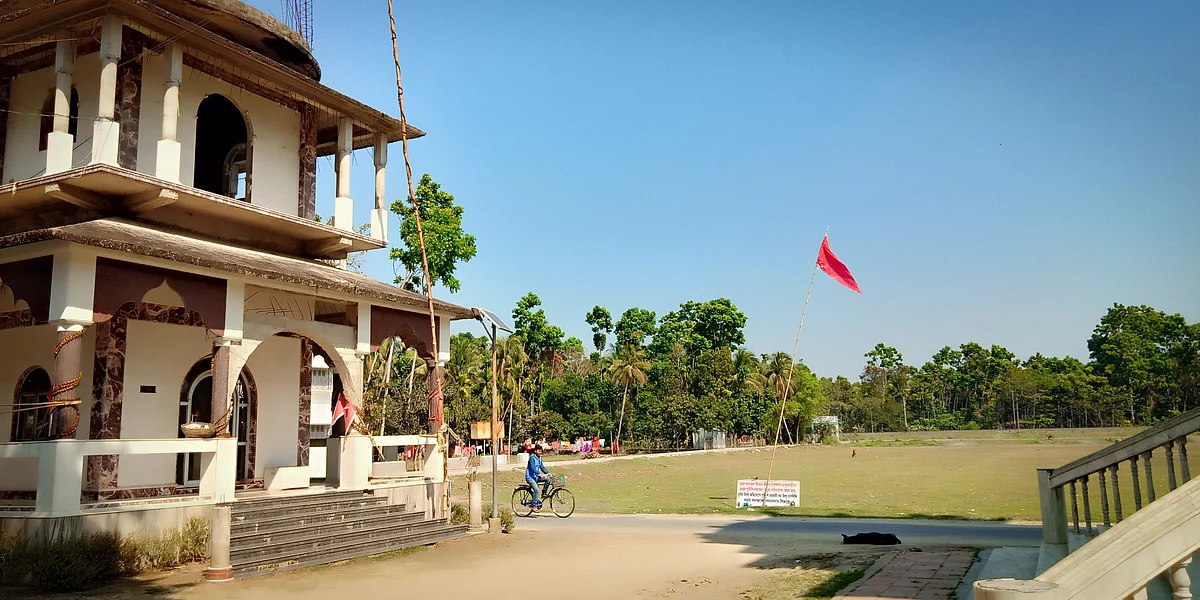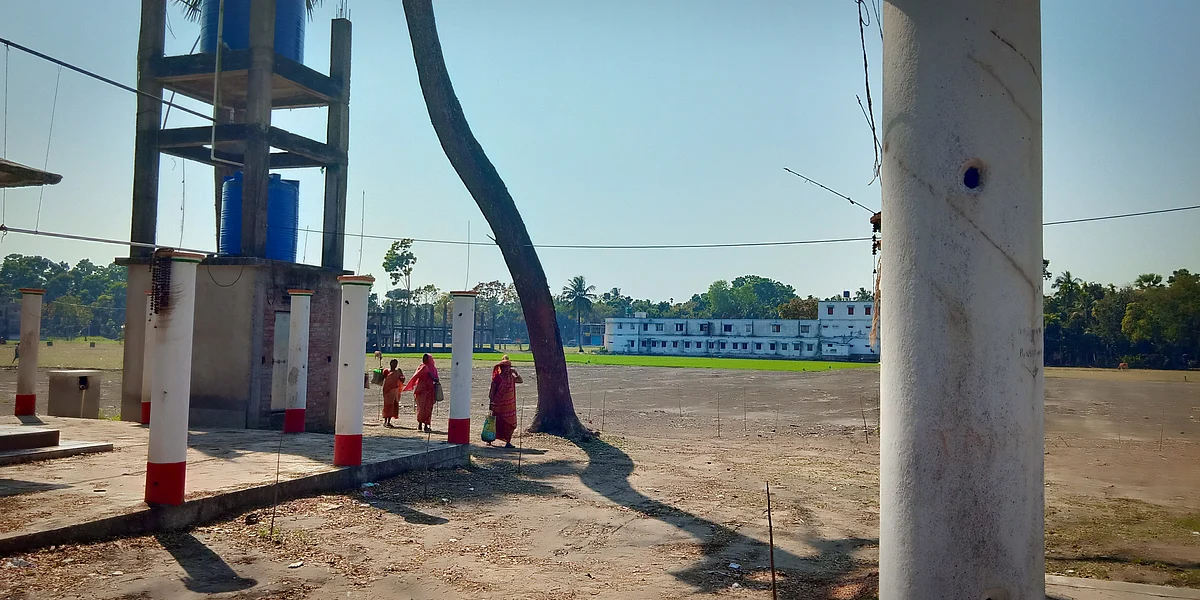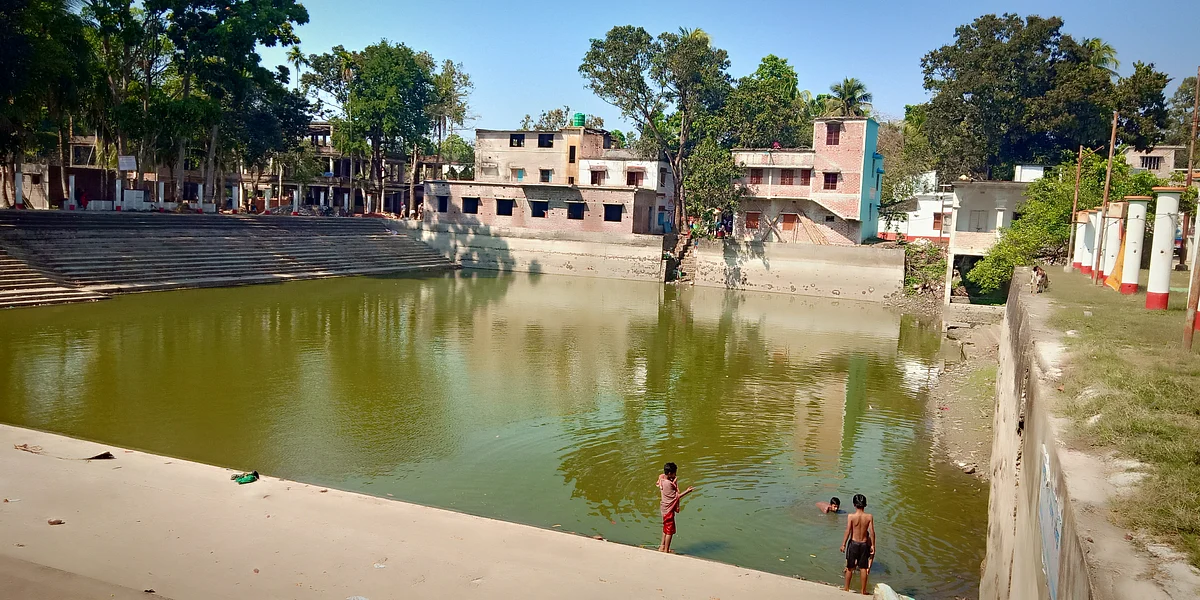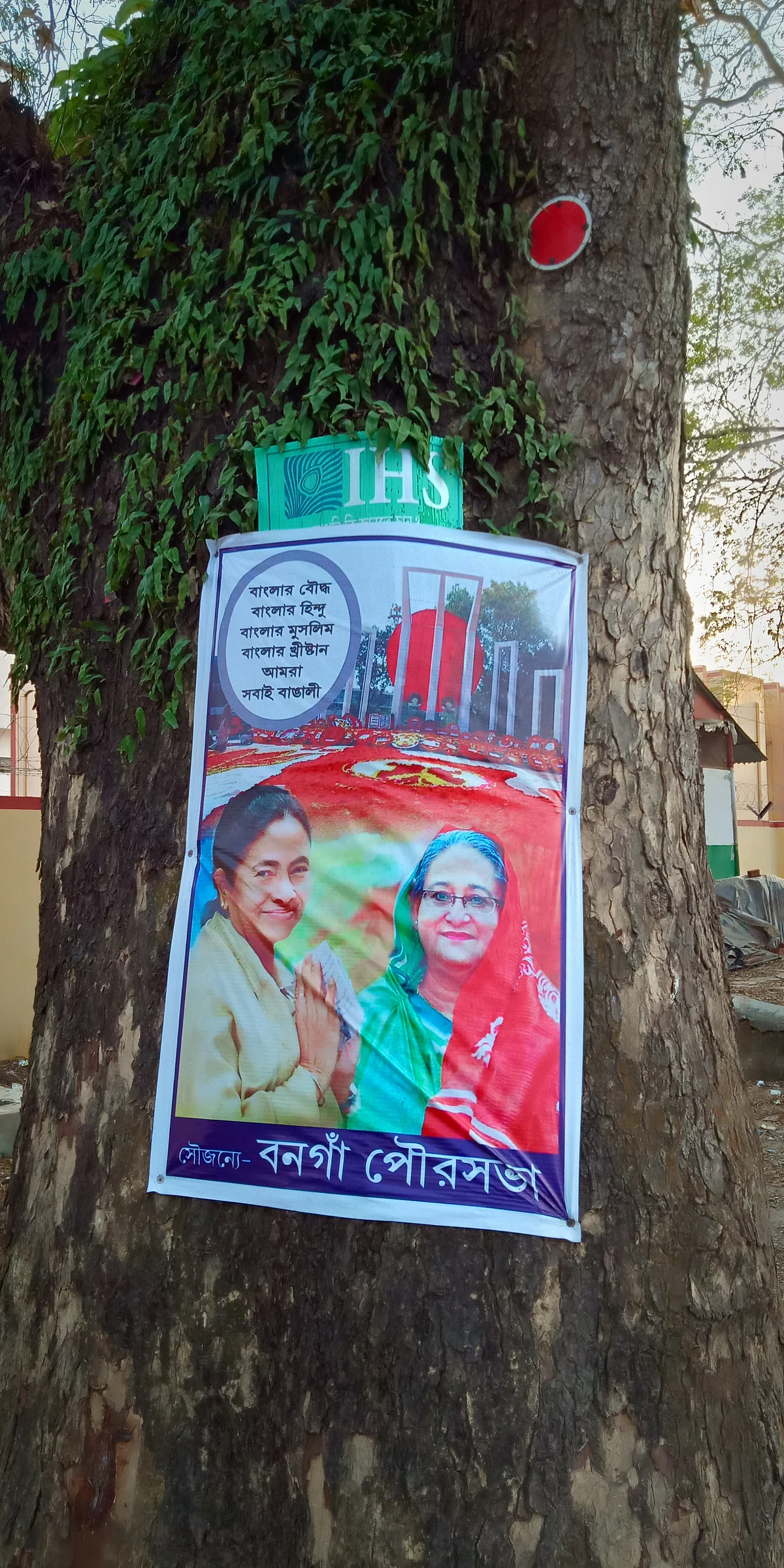How the Dalit Matua community could determine BJP, TMC’s fate in West Bengal’s Bongaon
The Matuas have emerged as a key community in the BJP’s attempts to storm Bengal, but one branch of the first family is aligned with the TMC.
The road that leads out from Kolkata to Bongaon is lined with beautiful trees of considerable age. This is Jessore Road: a road that’s been around for centuries whose existence predates the arrival of the British. It leads from Kolkata to the city of Jessore in what is now Bangladesh. Jessore itself is only 54 km from Bongaon, closer than Kolkata. After the drawing of maps and borders in 1947, border posts have come up at Petrapol and Benapol on the road, a short distance from Bongaon, marking the territories of India and Bangladesh respectively. Traffic across the border, both legal and illegal, has continued in both directions.

Petrapol border
The migration of people from what became East Pakistan in 1947 and Bangladesh in 1971 is now an election issue in Bongaon in 2019. It is one of the few places in West Bengal where the Citizenship (Amendment) Bill that proposes to give easy citizenship to non-Muslims migrants from Afghanistan, Pakistan, and Bangladesh is a matter of public concern. The reason for this is the presence of a large population of people from the Bengali Dalit spiritual community known as the Matua in Bongaon Lok Sabha constituency.
A fight in the family
The Matuas have emerged as a key community in the Bharatiya Janata Party’s attempts to storm Bengal. Prime Minister Narendra Modi visited Thakurnagar, the spiritual centre of the Matua community, in February to kick off the BJP’s Lok Sabha campaign in West Bengal. There, he went into the house of a 101-year-old Matua woman named Binapani Devi, touched her feet and sought her blessings. Devi, who passed away in March, was the matriarch of the Matuas—a community whose numbers in West Bengal are estimated at not less than 20 lakhs.
Any party that secures their electoral blessings stands a very good chance of winning the Bongaon seat, and a few more besides it. Doing so, however, will not be easy for either of the two main parties competing for the Matua vote—the Trinamool Congress and the BJP. The reason for that is a split in the first family of the Matua community, the Thakur family. While one branch of the family led by sitting Member of Parliament Mamata Bala Thakur is aligned with the Trinamool, another led by her nephews Subrata and Shantanu Thakur is with the BJP. Shantanu is the BJP candidate for the seat. The family feud is causing some difficulties for the Matuas.
Mihir Kanti Biswas lives a literal stone’s throw away from the Thakur family’s house that the Prime Minister visited. He is evasive about his political preferences. “We don’t take sides. The BJP, Trinamool, CPM, all come to us, and we say yes to all of them,” he says. All parties are the same, he adds, and “whoever goes to Lanka becomes Ravan”—a Bengali aphorism rooted in the story of the Ramayana. A hint of who he might like to send to “Lanka” slips in a little later.
There’s a large field opposite his house. Was that the ground in which Modi held his Thakurnagar rally? “They didn’t give this ground to Modi,” he says. “That was wrong. He is Prime Minister of India after all.”



Images from Thakurnagar, a place which is at the heart of Matua’s spiritual and political life
It turns out that Mr Biswas himself is from the Thakur family, although he is not one of its leaders. The Modi rally was eventually held in an empty patch of farmland behind his house after the state government denied the BJP permission to use the ground for Modi’s rally saying it was already booked for a Matua religious ceremony. His wife chips in to say that 400 women had been called to greet the prime minister with flowers, and she had gone. They were not allowed to do so by security, and she returned without staying to attend the rally. “Mamata Thakur is my nanad (sister-in-law). When she comes to call me for things, I go. When Subrata comes to call my husband, again we go,” she says.
No new migrants please
Both husband and wife have much to say about migration from Bangladesh, which has made the Citizenship (Amendment) Bill a key BJP poll promise here–with consequences for Northeast India. Some people in Thakurnagar arrived as late as 15 years ago, they say. Others have been there for a very long time. “The Bangladeshis”, he says, “are clever and have no fear or shame. They do whatever they have to do to get ahead…we can’t do the things they do.” Mrs Biswas complains that the later arrivals from Bangladesh pay bribes to get documents, after which their kids join schools and eventually take away scarce jobs from the locals.
Mr and Mrs Biswas, both Matuas, are not enamoured by the later migrants from their own community, and do not favour continuing migration. However, they evade direct answers on the Citizenship Bill and speak instead of how the influx has pushed up property prices. “My father-in-law arrived with Thakur Moshai when he came. We bought this land, 1 bigha, for ₹50. Now it is worth at least ₹10 lakh,” says Mrs Biswas. The “Thakur Moshai” she refers to is Pramath Ranjan Thakur, the founder of Thakurnagar, and grandson of Harichand Thakur, founder of the Matua sect.
Harichand Thakur came from a farming family of the Namasudra caste in Gopalganj in what is now Bangladesh. He founded the sect in the mid-1800s. The village of Orakandi in Faridpur where he died became the sect’s headquarters. When Partition happened, the Matuas were largely on the wrong side of the line—and confused about whether to move to India or stay back in East Pakistan. This was because the prominent Bengali Dalit political leader Jogendra Nath Mandal, who was also from East Bengal, had decided to throw in his lot with the Muslim League and stay back in Pakistan.
Harichand’s grandson Pramath Ranjan, who was then the spiritual leader of the Matuas, chose to move to India. In December 1947, according to a paper by Sekhar Bandyopadhyay and Anusua Chowdhury in The Politics of Caste in West Bengal, he bought a patch of land close to the new border near Bongaon and set up Thakur Land Industries Limited, a housing colony for refugees. This was the beginning of Thakurnagar, which is today at the heart of Matua’s spiritual and political life.
The long shadow of history
The bulk of the Dalit Bengali migration from East Bengal which had suddenly become East Pakistan in 1947 started only after Jogendra Nath Mandal, who had supported the Muslim League and the creation of Pakistan and became the country’s first Law Minister, was forced to quit and move to India in 1950. This was a couple of years after the death of his mentor Mohammed Ali Jinnah.
A sharp spike in migration occurred in 1964, when the theft of a treasured religious relic, a strand of hair believed to be the prophet Muhammad’s, from Hazratbal in Kashmir, triggered ethnic cleansing of Hindus in East Pakistan. Pramath Ranjan Thakur was then a Congress MLA.
The ethnic cleansing subsided only to reach a horrific new level in 1971, when one of the worst genocides in world history was perpetrated by the Pakistan Army in East Pakistan, sparking off a wave of refugee migration and forcing India to go to war. The country of Bangladesh emerged from this war.
This history casts a long shadow. The current tensions over the Citizenship (Amendment) Bill and its obverse, the National Register of Citizens, are its leftovers.
Arabindo Biswas, spokesman of the faction of All India Matua Mahasangha aligned with the BJP, says, “As long as there are Hindus in Bangladesh, there will be some coming. The miyas don’t let them live in peace.” These people will have to be given refuge here, he says. His position on the Citizenship Amendment Bill is the stated BJP position—that it rights a historical wrong, and must be passed. “No Hindus are foreigners in India,” he says. He caps this with a slogan: “Matua hith mein jo kaam karega, wahi desh mein raaj karega.” Whoever works in the interest of Matuas will rule the country.
He has some other grouses with history, too. “Guru Thakur had helped Babasaheb Ambedkar when he was being cornered by the Congress. Jogen Mandal gave him his seat. He won his seat with the help of the Matuas,” he says. “Why did he go to Buddhism after that?” The departure of Ambedkar, who won his provincial assembly seat and his place in the Constituent Assembly from Jessore and Khulna in East Bengal, from the broader Hindu faith is something that does not sit well with him.
The question of Jogen Mandal still stirs in the Dalit politics of West Bengal. Across the road, barely 100 metres away in the office of the current MP, Mamata Thakur of Trinamool Congress, her secretary Sataur Modak gets thoughtful when the question of why the Bengali Dalits did not move to India at the time of Partition comes up. “It was because of Jogen Mandal,” someone pipes up, but Modak springs to his defence. “He stayed back to look after the people who could not move,” he says. “He tried to ensure their safety in Pakistan.” It eventually did not work, Modak admits, but the intention—of trying to ensure that people escaped the pangs of Partition—was a noble one.
Identity and the citizenship bill
Today, however, he is on the side of the Matua faction that opposes the Citizenship (Amendment) Bill—and the National Register of Citizens in Assam. “The Citizenship Bill and NRC are issues here,” he says. “Out of the 40 lakh left out from the NRC in Assam, a lion’s share are Matuas.” He is ready with the Trinamool party position on the Citizenship Bill, and lays it out in the form of a printed handbill in Bengali. Its heading, in translation, says: “Black flag protest against Narendra Modi for fraud and betrayal of Matuas and all Bengali displaced on citizenship issue.”
Modi did not remember the displaced people throughout his entire tenure and then started running to Thakurnagar when the Lok Sabha polls were around the corner, it starts by saying. No problems of displaced people were solved during his tenure; instead, new problems were created and multiplied through the NRC. Now, he is spreading lies by saying the Citizenship (Amendment) Bill will solve all the problems of the displaced people, whereas it will be almost no use to any of them. “This is not our view, this is the view of the country’s head of intelligence presented before the Joint Parliamentary Committee…JPC wanted to know, how many people will be benefited if this bill is passed? The answer was 31,313. Of these only 100-150 are Bengalis.”
The fact of the matter is that if the Bill is passed it will create great difficulties for those who have arrived earlier from Bangladesh and settled in as they will have to declare their Bangladeshi origins or face government action, says the pamphlet issued in the name of the All India Matua Mahasangha. It adds, “If this Bill is passed, no one will become a citizen. Refugees will only be able to submit applications for citizenship. This was given in writing by Modi government’s law ministry.”
Whether or not the Bill will eventually help may be a matter of debate, but for the man and woman on the street who is not directly affected by it, the issue boils down to one of identities. Two scruffy men on a motorcycle say, “This is a Hindu area”. They explain the local geography further by saying there’s a Muslim settlement down the road. They are not Matuas. They are from a community called the Mashishya. They don’t want to give their names and react with suspicion to further questions.
However, identity politics cuts in opposing directions. Outside Thakurnagar, closer to Bongaon town, Tarun Das, who works as a hospital security guard, says, “People live peacefully together here…there is no communal issue.” He is careful to mention that Hindus and Muslims coexist in the area. He describes the neighbourhood, quite plainly, as a Trinamool area.
Das was a rarity in an area marked by general wariness about talking politics with a stranger. A group of men sitting at a street corner dodged questions of politics saying, “We have nothing to do with any political party, we are a drinking party.” They reiterated the point about it being a peaceful area.
The repeated invocations of peace probably have something to do with the fact that coercion and violence are part of the political culture in Bengal. Most people don’t want trouble, and therefore don’t want to be seen taking sides. They also don’t want rioting—and the BJP is seen as a party likely to cause riots.
Equations and numbers
Petrapol is barely six kilometres from Bongaon down the Jessore road. It is a busy place, with lines of container trucks and crowds milling about on both sides. People click selfies with tall BSF jawans in uniforms with fancy red headdresses. Posters of Mamata Banerjee and Bangladesh Prime Minister Sheikh Hasina, photoshopped together, declare: “Bengals’ Buddhists, Bengal’s Hindus, Bengal’s Muslims, Bengal’s Christians, we are all Bengalis.” Barely 50 metres away is Bangladesh.

A poster of Mamata Banerjee and Bangladesh Prime Minister Sheikh Hasina photoshopped together.
The Lok Sabha constituency of Bongaon has seven assembly constituencies in it. Gaighata, where Thakurnagar is located, is only one of these. The CPI(M) has put up former Nabadwip MP Alakesh Das, who is from the assembly constituency of Kalyani in Bongaon LS area, as its candidate. The CPI(M) polled more than 4 lakh votes and came second in 2009 and 2014. In 2015, there was a by-poll after sitting Trinamool Congress MP Kapil Krishna Thakur passed away, when his wife Mamata Thakur was elected. Then too, the CPI(M) placed second, but this time, with 3.28 lakh votes, narrowly ahead of BJP’s Subrata Thakur who polled 3.14 lakh votes.
The BJP in West Bengal has gained vote share in leaps and bounds, and Bongaon has been no exception. Here the party placed third in both 2009 and 2014, but there was a great difference. In 2009, it was third with 3.95 per cent of the vote. In 2014, it came third with more than 19 per cent of the vote. In 2015, this had increased to 24.17 per cent.
The BJP will be hoping it can add another 10-15 percent to its vote share, at the expense of the Trinamool and the CPI(M), in order to win the seat. This is not impossible, but it is also not easy, especially in Bongaon where the party has had internal dissent. Its candidate, Shantanu Thakur, himself failed to show up for a rally by Uttar Pradesh Chief Minister Yogi Adityanath held to support his candidature and then held a press conference ascribing his absence to an upset stomach. Whether or not his stomach was upset, Yogi Adityanath apparently was.
The combination of multiple unknowns makes any attempt to predict the electoral outcome in West Bengal a particularly fraught exercise, especially since a lot of voters are wary of indicating their political preferences. In other words, there might be a hidden BJP vote that is not expressed publicly. That is what BJP strategists are hoping for. The Trinamool is hoping this is not the case, and their forces will hold the citadel against its strongest challenge yet.
Which outcome fructifies may decide the outcome of the 2019 General Elections.
